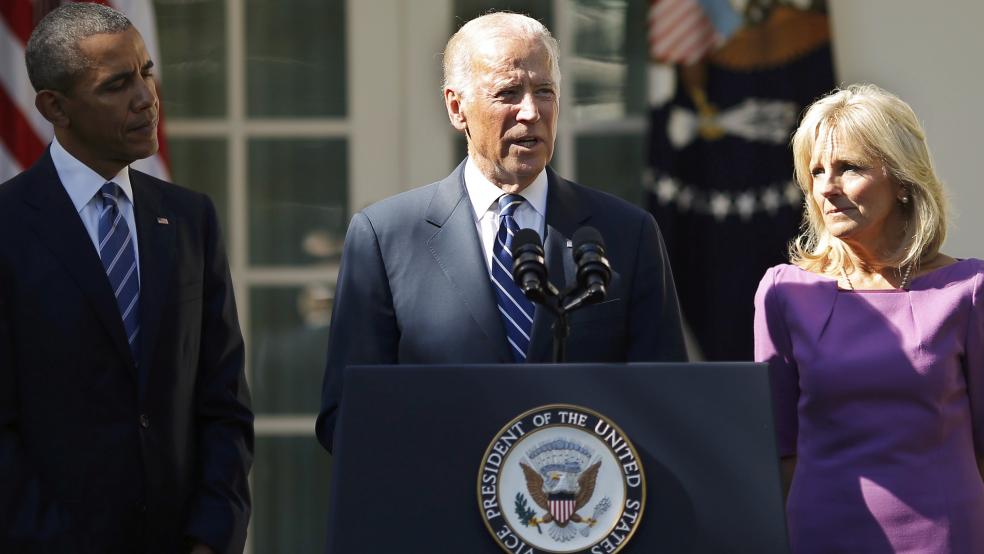WASHINGTON (Reuters) - U.S. Vice President Joe Biden said on Wednesday he would not run for president in 2016, ending months of indecision and removing one of Democratic front-runner Hillary Clinton's biggest potential obstacles to the party's nomination.
Biden, 72, appeared in the White House Rose Garden with his wife Jill and President Barack Obama to say the window for mounting a successful campaign had closed.Biden's announcement ended a highly public "will he or won't he?" political guessing game about his intentions that had shadowed Clinton's campaign and frozen the support of some Democratic activists and donors."While I will not be a candidate, I will not be silent," Biden said. "I intend to speak out clearly and forcefully to influence as much as I can where we stand as a party and where we need to go as a nation."Biden had been wrestling with doubts about whether he and his family were ready for a grueling campaign while still mourning his son Beau, who died of brain cancer in May. His son had urged him to run.Making good on his promise to speak out, Biden took a veiled jab at Clinton, chiding Democrats who referred to Republicans as their enemies and saying Democrats would be making a "tragic mistake" if they walked away from Obama's record.Clinton had listed Republicans among her enemies during last week's presidential debate and had broken with Obama by moving to the left on such issues as the Keystone XL pipeline and the Trans-Pacific Partnership."I don’t think we should look at Republicans as our enemies. They are our opposition, they’re not our enemies," Biden said.Speculation about a Biden candidacy had grown as Clinton slumped in polls and questions grew about her honesty and trustworthiness amid the controversy over her use of a private email server while secretary of state.But what was widely hailed as a command performance by Clinton in the Oct. 13 Democratic debate turned the tide back in her favor and quieted talk that she was vulnerable in her quest for her party's nomination for the November 2016 election.A Clinton spokesman said she called Biden after he announced his decision. In a statement, she called him "a good man and a great vice president" and said she was confident he would continue to be on the political front lines.BOOST FOR CLINTONClinton's prime challenger now is U.S. Senator Bernie Sanders of Vermont. A self-styled democratic socialist, Sanders has galvanized the party's left wing but has yet to prove he can broaden his appeal."It's an easier path for Hillary Clinton now," said Democratic strategist Bud Jackson. "Most polls reflect that without Biden in the race, it's more beneficial to her."But Biden supporters did not appear to be falling in line behind Clinton after the announcement, with 15 of the 27 contacted by Reuters saying they were unsure they would back her.Longtime Biden supporter Sara Riley, of Cedar Rapids, Iowa, said she was now "100 percent" behind another Democratic contender, former Maryland Governor Martin O'Malley, although she will back Clinton if she is the nominee.Democratic fundraiser Daniel Alpert, managing partner at Westwood Capital, a New York-based boutique investment bank, said he is now undecided between Clinton and Sanders. He wants more clarity on Clinton’s policies, and wants Sanders to prove that he can run a credible campaign in the general election.Enthusiasm was muted even among the 12 Biden supporters interviewed by Reuters who said they would now support Clinton. Joseph Conaway, 78, the former mayor of Bridgeville, Delaware, and a friend of the Biden family, said he was planning on going to Iowa to work for Biden had he run.“I have no reason to go to Iowa now,” he said.'OUT OF TIME'Jumping into the race so late would have been a huge challenge for Biden, who would have had to quickly build a fundraising network and campaign structure ahead of the first nominating contest in Iowa on Feb. 1."Unfortunately, I believe we're out of time, the time necessary to mount a winning campaign for the nomination," Biden said in the Rose Garden. "The process doesn’t respect or much care about filing deadlines or debate or primaries and caucuses. But I also know I couldn’t do this if the family isn’t ready.”Biden, who is popular with white, working-class voters, could still play a major role and become a valuable surrogate for Democrats against the Republican nominee in the general election campaign.Clinton's support among Democrats jumped after the October debate, a Reuters/Ipsos poll showed. On Tuesday, Clinton had the backing of nearly 49 percent of poll participants, followed by Sanders at almost 26 percent. Biden's support was at 14.5 percent, with a credibility interval of 3.7 percent.A White House official, speaking on condition of anonymity, said Biden made his decision not to run on Tuesday night.Another official, spokesman Eric Schultz, said Obama had served as a "sounding board" for Biden during the process. "That’s not just as he copes with unspeakable loss, but also as he makes very personal decisions about his political future," Schultz, traveling with Obama, told reporters on Air Force One after Biden spoke.Biden ran for president in 1988 and 2008, both times failing to gain traction despite more than three decades as a U.S. senator from Delaware. (Additional reporting by Steve Holland, Erin McPike, Alana Wise, Luciana Lopez and Emily Flitter; Editing by Howard Goller)Biden won't run in 2016, boosting Clinton's White House hopes

CARLOS BARRIA



